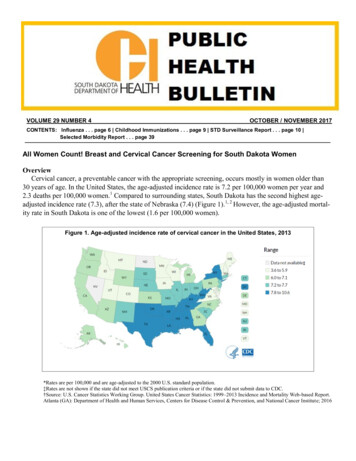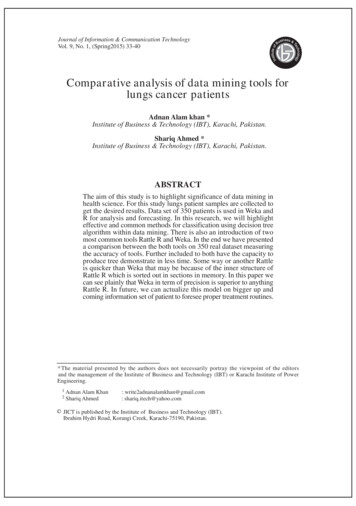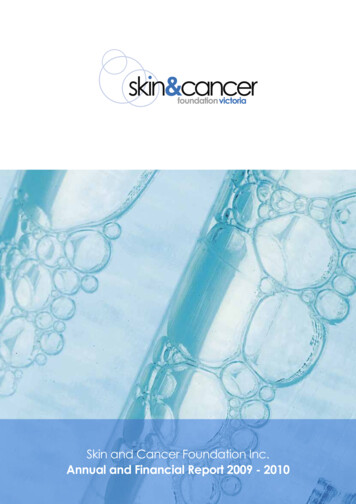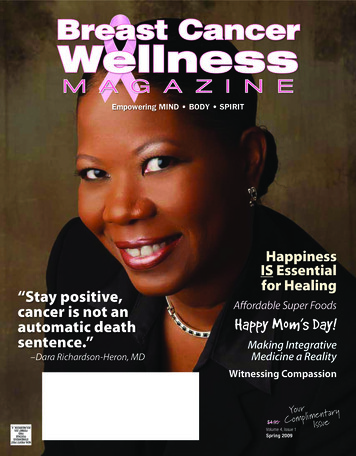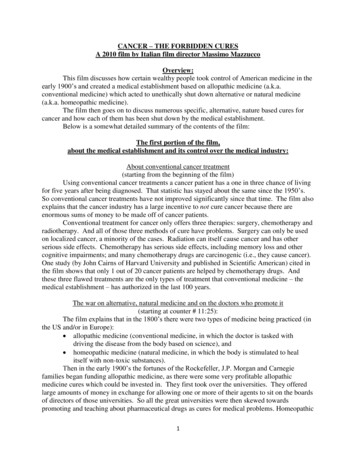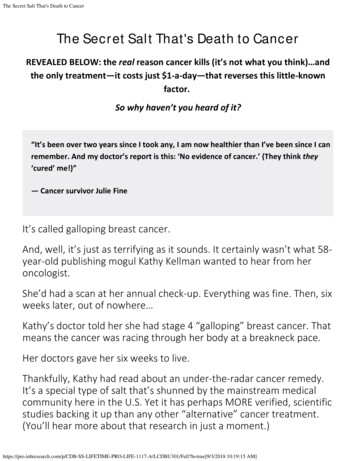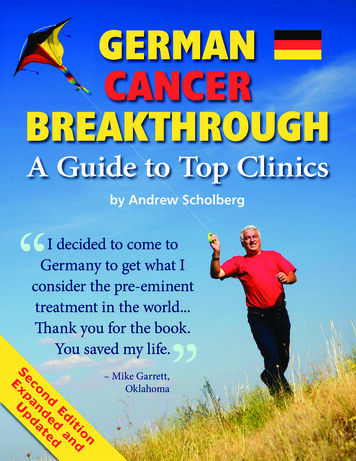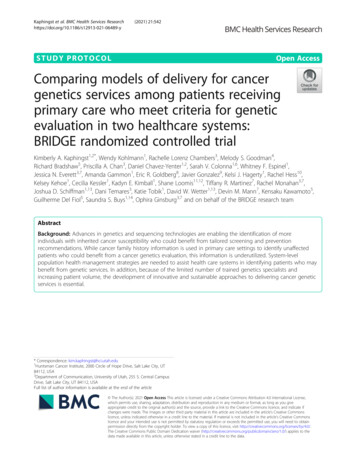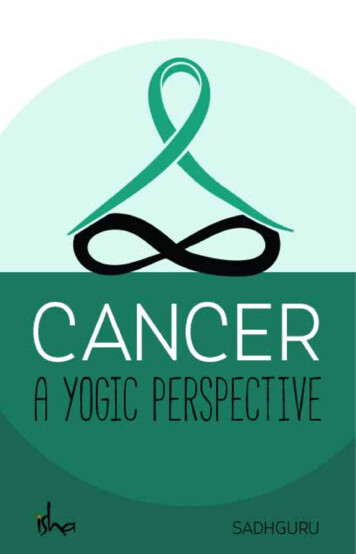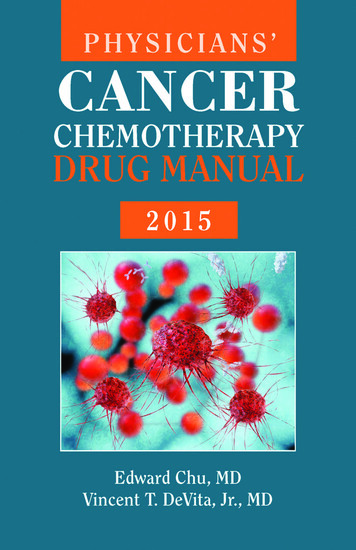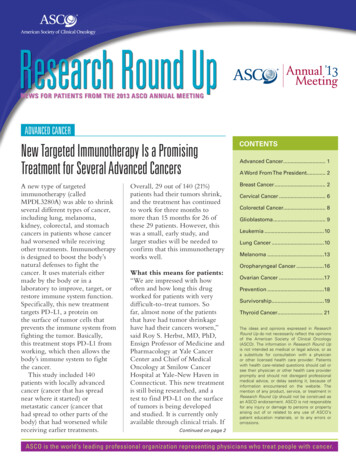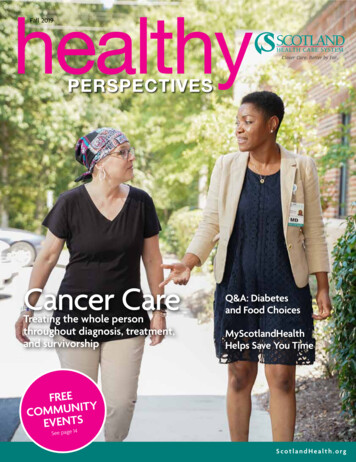
Transcription
Fall 2019Closer Care. Better by Far.Cancer CareTreating the whole personthroughout diagnosis, treatment,and survivorshipQ&A: Diabetesand Food ChoicesMyScotlandHealthHelps Save You TimeFREEYCOMMUNITEVENTSSee page 14S co t la n d H eal t h . o rg
Inside .FROM THE PRESIDENT AND CEO3 Welcome New Medical Providers4 Type 2 Diabetes and Food Choices4 Recipe: Chicken Quinoa Soup5 Are You Getting Enough Sleep?6 Nurse Cait Locklear ReceivesDAISY Award6 Our Scholarship Program7 Primary Care: The Gateway inHealth Care8 Fighting Breast Cancer, Together10 Treating the Whole Person12 Colon Cancer Screenings Save Lives12 Save Time with MyScotlandHealth13 3 Steps to Help You Quit Smoking14 Community Events14 SHCS Earns Energy Star Certification15 Scotland Memorial FoundationRecognizes Tartan Club MembersNurses You Can Rely OnWe are here for you and delighted that we are. As yourcommunity’s health care system, we realize our role is to helpyou stay healthy, diagnose problems early, and provide thehighest quality and most compassionate medical care when youneed it. We are proud of our facilities and technology, but moreproud of the team of committed and skilled caregivers andvolunteers who make it happen.Nearly 200 nursing professionals anchor our team within thehospital, in our practices, and throughout our system. Most ofthem are local—neighbors, friends, and family who know you,understand you, and are committed to meeting your needs.Not only are they excellent clinically, they also make sure youfeel safe, keep you informed, and ensure you are involved inall your care.Please know that whether you are visiting us for ascreening, a doctor visit, or hospital care, our nurses andother caregivers are ready to meet your needs—every day,every time.Have a great fall—and don’t forget to get your flu shot!16 2019 Ritz Raffle: Tickets and PrizesGreg WoodPresident and Chief Executive OfficerDavid H. HarlingChair, Scotland Health Care SystemChip ShytleVice Chair, Scotland Health Care SystemGregory C. WoodPresident and CEODave SalzleinVice President, Strategic ServicesTracie M. StubbsMarketing CoordinatorContributing WritersKirsten Dean, Scotland Memorial FoundationPaula Love, Scotland Cancer Treatment CenterMary Callahan-Lopez., Scotland Cancer Treatment CenterLeslie Herndon, Breast Health NavigatorPhotographyQuinyon DeBerry, RQDEBERRYPrinted on Recyclable Paper 807MCONNECT WITH USA Joint CommissionTop Performer
Welcome OurNew Medical ProvidersWe welcomeour newmedicalprofessionalsto theScotlandHealth CareSystemmedical staff. RADIATIONONCOLOGY SCOTLANDPHYSICIANSNETWORK ACP CARDIOLOGYACP CARDIOLOGYACPNorleena Gullett, MDScotland CancerTreatment CenterJennifer Locklear, MDPembroke FamilyPracticeHolly Schmitt, ACNP-CCardiology DepartmentRene Anderson, DNP,ACNP-CCardiology Department SCOTLANDPHYSICIANSNETWORK ACP SCOTLANDPHYSICIANSNETWORK ACP SCOTLANDPHYSICIANSNETWORK ACPHolly Rowell, MSN,APRN, FNP-BCMarlboro FamilyPractice andUrgent Care ACPGloria A. Hunt, MSN,RN, FNP-CSPN FloaterJessica Kelley, MDHarris FamilyPracticeLEARN MORE aboutour new medical staff andother providers atscotlandhealth.org/Find-a-Doctor.CLOSER CARE . BETTER BY FAR.3
Q&A: Type 2 Diabetesand Food ChoicesDiabetes educator FelisaHammonds, FNP, answersquestions about food choices andblood sugar management, which helps delayor prevent potential diabetes complications,such as kidney, eye, and heart disease.SHOULD LIMITING SUGARBE MY MAIN CONCERN?Sugar is one type of carbohydrate. As agroup, carbs have the biggest effect on yourblood sugar (glucose) levels. When you eattoo many carbs—of any type—at once,your blood sugar level can go too high.HOW CAN I AVOID EATINGTOO MANY CARBS?Balancing meals with lean meats,nonstarchy veggies, and starches isthe first key to controlling your overallblood sugar. Some carb-rich foods, suchas sweets, rice, pasta, and breads, mayincrease your blood sugar more thanothers. Less processed foods with morefiber and nutrients are better choices.The second key to lowering ormaintaining normal blood sugar levelsis avoiding sugary beverages, such asregular soda and fruit drinks.While food choices are important,physical activity, medication, blood sugarmonitoring, and regular visits to yourhealth care provider are also importantfor controlling your diabetes.DOES MY DIABETES MEDICINEAFFECT MY FOOD CHOICES?Insulin helps glucose move from theblood into your muscle cells, where it canbe used for energy. Diabetes medicineseither help you make more insulin orhelp your insulin work more efficiently.Consequently, your medicines and foodchoices work together to lower yourblood sugar.DO I REALLY NEED TO HAVE ADIABETES MEAL PLAN?Yes. A meal plan shows you the types offood to eat, how much, and at what timesof the day. It should take your medicines,favorite foods, and physical activity intoaccount. The focus will be on healthyfoods, including: Fruits and vegetables Whole grains Nonfat or low-fat dairy products Lean meats, poultry, fish, eggs, and driedbeans and peas Foods and drinks with no added sugarYou can work with a diabetes educatoror dietitian to update or create apersonalized meal plan. You shouldalso talk about how to make healthychoices. For example, consider the totalcarbohydrate amount on food labelswhen counting carbs, not just sugars.You can schedule an appointment withdiabetes educator Felisa Hammonds at anyof the six Scotland Physicians Networkfamily practice locations. For locationdetails, visit scotlandhealth.org. Pleasecontact your primary care provider for areferral before making an appointment.Felisa Hammonds, FNPDiabetes EducatorScotland Physicians Network4scotlandhealth.orgChicken Quinoa SoupINGREDIENTS1 cup uncooked quinoaOlive oil spray1 lb. boneless, skinless chicken breasts,cut into cubes1 small yellow onion, diced1 cup diced carrots4 cups roughly chopped kale32 oz. unsalted chicken stock or broth2 cups water½ tsp. sea salt½ tsp. freshly ground black pepper1 tbsp. minced fresh parsley1 tbsp. minced fresh thyme1 tbsp. lemon zest1 tbsp. lemon juiceDIRECTIONSCook 1 cup quinoa as instructed onpackage. Set aside. Spritz a large potwith olive oil spray. Heat on mediumhigh for two minutes. Then add cubedchicken breasts and sauté until cooked,about five minutes. Add onions andcarrots; sauté for five to eight moreminutes, until cooked and softened,stirring frequently. Continue stirring andadd kale. Sauté for two more minutes oruntil wilted. Add quinoa, chicken stock,and water, then season with salt, pepper,fresh herbs, lemon zest, and lemon juice.Cook until everything is hot, about fiveto 10 more minutes.Serves five. Each serving contains about260 calories, 5 g fat, 1 g saturated fat,0 g trans fat, 70 mg cholesterol, 400 mgsodium, 26 g carbohydrates, 5 g fiber,4 g sugar, and 28 g protein.
Are You Getting Enough Sleep?When it comes to shut-eye, seven or eight (hours) isyour lucky number. Nighttime stretches of sleepfalling into this range help you stay healthy—andfeeling good during the day.In fact, sleep and mental health go hand in hand. Lackof quality sleep can make people feel irritable, fatigued, andforgetful. It can even lead to anxiety and feeling depressed. Butdepression and anxiety can also result in sleep disturbances. Itis important to talk about your overall health when discussingsleep problems—and how to address them—with your healthcare provider.THE ‘RULE’ OF 3Most people have trouble sleeping at some point. Withthe sleep disorder insomnia, however, one or more of thefollowing symptoms last at least three months and occur atleast three nights a week: Not being able to fall asleep Waking up too early Not feeling rested after sleepingYou may also wake up during the night and have troublefalling back to sleep. Older adults, women, and people withdepression or other conditions, like sleep apnea and asthma,have a higher risk for insomnia.A variety of medicines can influence how you sleep. Forexample, insomnia can result from taking beta-blockers usedto manage high blood pressure. High stress and time changesduring travel can also increase your risk.HELPFUL HABITSYour daily habits can impact your sleep. Brisk walking andother moderate-to-vigorous physical activities can boost thequality and length of your sleep. Both early morning andafternoon workouts can improve your nighttime sleep. Buthaving caffeine and foods that cause heartburn at night can hurtyour efforts to sleep. Sugary treats and white bread can also affectsleep. Instead, try oatmeal or cottage cheese with fresh raspberries.Small changes to your habits can help with many sleepproblems. But reach out to your provider if you continue tostruggle. Share your symptoms and past efforts to sleep better.Bring your current medications to your visit. Together, you canfind and treat the cause.Sleep Clinic Achieves Full AccreditationAfter undergoing a stringent on-site review and program audit bythe American Academy of Sleep Medicine (AASM), Atrium HealthSleep Medicine – Scotland, located in Laurinburg, was awarded fullaccreditation in July.To receive accreditation for a five-year period, the Sleep Centerhad to meet or exceed all standards for professional health care asdesignated by the AASM. The standards addressed key areas such aspersonnel, facility and equipment, policies and procedures, dataacquisition, patient care, and quality assurance. The Sleep Centeralso had to state its plans for positively affecting the quality ofmedical care in the community it serves.The Sleep Center offers outpatient diagnostic testing forsnoring, sleep apnea, and sleep myoclonus (involuntary musclemovements). Patients spend one night in one of the Sleep Center’sfour private rooms for a simple, painless procedure where yourbrain waves, muscle activity, leg movements, heart rhythms, andother body functions are monitored by a highly skilled sleeptechnologist while you sleep. The sleep data is then interpreted bya board-certified pulmonologist and sent to your orderingphysician. Your physician then provides you with the results and adiagnosis and recommends a treatment plan appropriate for you.If you’re interested in a referral for a sleep study, please talkto your primary care physician. All appointments are scheduledthrough the Sleep Center at 1-877-275-3373 (toll-free). For moreinformation about the Scotland Sleep Center, call GaryHatchell, Senior Director of Rehab Services, at 910-291-7800.CLOSER CARE . BETTER BY FAR.5
Telemetry Unit NurseCait Locklear ReceivesDAISY AwardEach quarter, Scotland Health Care System (SHCS) honorsone of its nurses—who was nominated by a patient,family, physician, or colleague—with a DAISY Award.The Award is part of the DAISY Foundation’s national programto recognize the superhuman tasks nurses perform every day.This past quarter’s DAISY Award honoree is CaitLocklear, RN, who is a nurse resident in the Telemetry unit.The nomination letter highlighted both her work ethic andcompassion with an example of how she cared for a patientwith a terminal diagnosis:Cait’s patient was upset that he would be in the hospital on Easterand miss watching his granddaughter at an annual egg hunt. Hedidn’t think he would be here to see it next year. Cait devised a planfor the patient’s family to visit him at the hospital on Easter Sunday.That morning, even though she was on call and didn’t have to cometo work, Cait came in, brought supplies, and orchestrated a wonderfulEaster egg hunt for this patient and his granddaughter.For information about The DAISY Foundation program atSHCS, call Holly Goodwin at 910-291-7530.Cait Locklear, RNYou Can Nominate an Extraordinary NurseAnyone can nominate a SHCS extraordinary nurse for the DAISYAward using one of the forms available throughout ScotlandMemorial Hospital or online at -Nurse-for-a-Daisy-Award.6scotlandhealth.orgOur Scholarship ProgramNurses throughout Scotland Health Care System (SHCS) provideessential, quality care to our patients every day. We appreciatetheir efforts and support them in their success. Here are insightsfrom a few of our team members about how SHCS attracts,develops, and retains phenomenal nurses.“We are pleased that so many of thearea’s graduates choose Scotland as theinstitution to build their career. Scotlandnurses have an incredible opportunity todevelop skills in multiple areasthroughout the hospital system.Scotland Health Care System iscomprised of Scotland MemorialRachel MooreHospital and Scotland PhysiciansNetwork, a large network consisting of 16 Assistant Director ofphysician practices. With the wide range Human Resourcesof clinical services and practices we havehere at Scotland, our employees have numerous opportunities.”—Rachel Moore, Assistant Director of Human Resources“As a private employer, Scotland hasdeveloped programs to train health careprofessionals and works closely withRichmond Community College, RobesonCommunity College, and the University ofNorth Carolina at Pembroke to offerresidencies, clinical rotations, mentoringprograms, and local faculty. Newly graduatedBebe Holt, CNO/VPregistered nurses participate in Scotland’sPatient Care Services nurse training programs, which provideclinical support, education, and mentoring.Our residency and preceptorship programs are extremelybeneficial for new nurses as they transition from the classroom tothe bedside. We are able to strengthen our community ties andhelp provide education and support to individuals who are lookingto enter into the health care industry.”—Bebe Holt, CNO/VP, Patient Care Services“Scotland is the area’s largest privateemployer. We are committed to hiring,developing, and retaining local employees.For new nurse graduates, the first year ofnursing can be the most challenging. AtScotland, we understand thosechallenges. Our yearlong nurse residencyprogram is structured to provide theLynn Wood, BSN, RN-BCnurse residents with additional supportNurse Residentand guidance as they start theirCoordinatorprofessional nursing career.”—Lynn Wood, BSN, RN-BC, Nurse Resident CoordinatorJOIN OUR TEAM! Visit scotlandhealth.org/careers forinformation about working at SHCS.
Primary Care:The Gateway in Health CareScotland’s primary care practices are close to home.The primary care practices within Scotland Physicians Network are committed to getting youhealthy and keeping you well. The primary care network serves as the gateway for preventivecare and your well-being. Scotland’s physicians are committed to providing quality care witha personal touch. At each visit, they will educate you with the information you need to makeinformed health decisions.With offices across the region and a team that’s trained to care for people of all ages,everyone’s health care can be taken care of in a convenient location close to you.For a complete listof Scotland HealthCare System’sphysicians, includingspecialists, visitscotlandhealth.orgor call 910-291-7517.Harris Family Practice700 Progress PlaceLaurinburg, NC 28352910-276-7676Glenn Harris, MDJessica Kelley, MDMoneika Murphy, MDKatie Notaro, MDJaclyn Bates, PALindsay Reese, PAMaxton Family Practice24420 Marlboro St.Wagram, NC 28396910-369-3136Matthew Manzo, MDTeri Weber, PAWolonickFamily PracticePembrokeFamily PracticeMarlboro Family Practice 410 South Jones St.and Urgent CarePembroke, NC 28372957 Cheraw St.Bennettsville, SC 29512843-454-0245Haynes Cain, MDDavid Howell, MDGail Cain, NPGye Mitchell, NPHolly Rowell, NPWagram FamilyPractice1001 West Dr. Martin LutherKing Jr. DriveMaxton, NC 28364910-844-4077Ashleigh Freeman, MDJonathan Rowson, MDKara Hiendlmayr, PA910-521-4462Lisa Bracey, MDC hamaine Brooks-Locklear, MDAaron Locklear, MDJennifer Locklear, MDShelly Lowery, MDScot Hunt, PA106 McAlpine LaneLaurinburg, NC 28352910-277-8044Richard Wolonick, MDCarol Hayes, PACLOSER CARE . BETTER BY FAR.7
When KarenButler heard shehad cancer inboth breasts, herheart droppedto her knees.FightingBreast Cancer,Together8scotlandhealth.org
Karen Butlerwas workinghard to repaintthe inside of her house,a project she wasdetermined to finishbefore the end of theweekend. On Sunday,she started to feel painin her right arm. Karenshrugged it off, thinkingit was a sore musclefrom repeatedly movinga paint roller up and downthe walls. The next day when she woke, the pain was even worse,and she felt a small mass in her right breast. When things didn’timprove over the next couple of weeks, Karen decided to see herprimary care provider (PCP).Without hesitation, her PCP ordered a 3D mammogramat Scotland. Thinking back to her last mammogram two yearsago, Karen assured herself this one would show nothing ofconcern, too.When Karen arrived for her appointmenton May 24, Deborah Gardner, RT(R)(M),Mammography Coordinator, welcomed her tothe Scotland Mammography Department andescorted her to ultrasonographer Sandra Bell inthe exam room. Once the exam was complete,Bell reviewed the results with Dr. OnyinyechiAgbara. Less than five minutes later, Dr. Agbarashared unwelcome news with Karen: Both of herbreasts had areas that were highly suspiciousfor cancer. This was news she didn’t expect andwasn’t prepared for. She was speechless.Then Leslie Herndon, Breast Health Navigator,stepped in to talk with Karen about next steps,including additional testing and the process of fighting cancer. Shealso met with Hope Gibson, Oncology Nurse Navigator, who wouldlater help her through the radiation and chemotherapy process.“Knowing that Leslie and Hope were there to guide me throughMAKE YOUR MAMMOGRAPHYAPPOINTMENT Scotland Health Care Systemremains the only provider of 3D mammographytechnology in the region. To schedule your 3Dmammography, call 910-291-7243.every step relieved some of my worries,”says Karen. “It was like we would befighting the cancer together.”Shortly after her 3D mammogram,Karen moved forward with bilateralbreast biopsies, performed byDr. Stephen Lanuti. The tissue samplestaken during this procedure were tested andconfirmed that she had cancer in each breast. After moretesting, Karen met with Dr. Lanuti and Dr. Ivy Altomare,who consulted on her case, to discuss oncology treatmentoptions. She immediately began treatment at Scotland CancerTreatment Center.Karen continues to fight the disease with help from her Scotlandteam. “The SCTC staff has been nothing short of amazing,” shesays. “The physicians and nurses explain everything that is takingplace in detail, andwhen they are talking tome, it’s like no one elseexists. I have their fulland undivided attention.”Karen urges otherwomen and men to dotheir self-exams and toschedule their routinescreenings. “They arevery important, and Iam a prime exampleof how a mammogramcan save a life.” Shealso offers this advice,“Stay informed about your health and the health of your family.Seeing your doctor regularly and knowing your body are veryimportant. If you feel like something isn’t right with you, then itprobably isn’t. Go get checked and be safe rather than sorry.”What Is 3D Mammography?Breast tomosynthesis, also called breast ultrasound or 3D mammography, produces a three-dimensional view of breast tissue that helpsradiologists identify and characterize individual breast structures without confusion of overlapping tissue. To create the 3D view, multiplelow-dose images of the breast are taken at different angles during the exam.The exam takes just a few seconds longer than a conventional 2D breast cancer screening exam and doesn’t require additionalcompression. Yet the 3D mammogram is 45 percent clearer than the standard 2D mammogram. Proven to save lives, 3D mammography candetect breast cancer 15 months earlier and reduces unnecessary callbacks by up to 40 percent.To learn more, visit es/3d-mammography.CLOSER CARE . BETTER BY FAR.9
TreatingCthe Whole Personancer doesn’t affect just one part of the body. That iswhy we offer a multidisciplinary team of specialistswho
Paula Love, Scotland Cancer Treatment Center Mary Callahan-Lopez., Scotland Cancer Treatment Center Leslie Herndon, Breast Health Navigator Photography Quinyon DeBerry, RQDEBERRY CONNECT WITH US. Welcome Our New Medical Providers We welcome our new
